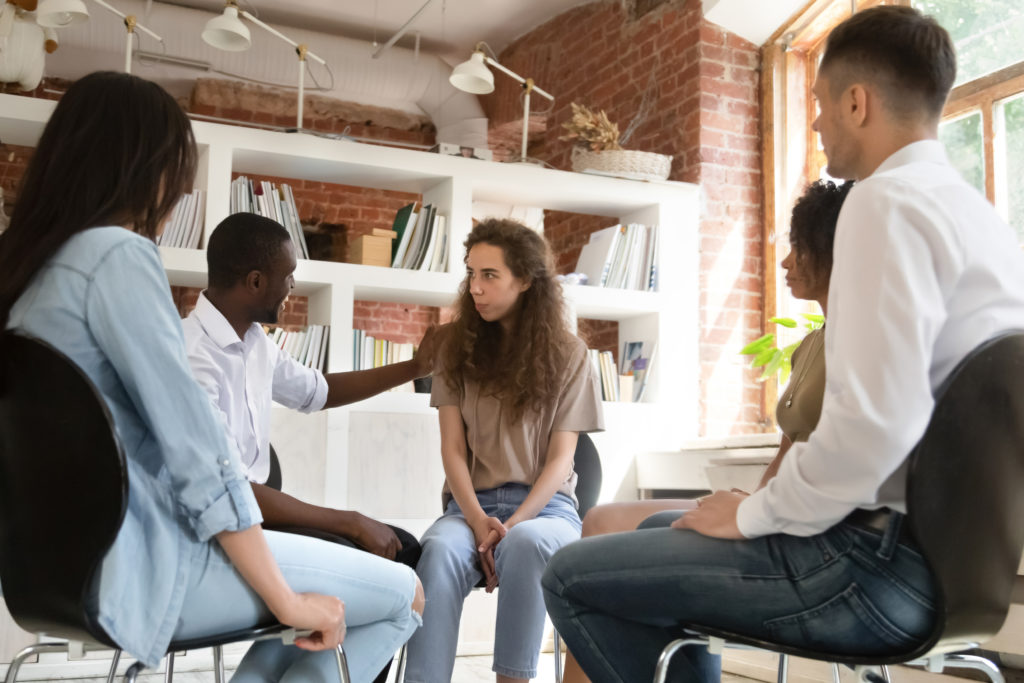- Calls to this hotline are currently being directed to Within Health or Eating Disorder Solutions
- Representatives are standing by 24/7 to help answer your questions
- All calls are confidential and HIPAA compliant
- There is no obligation or cost to call
- Eating Disorder Hope does not receive any commissions or fees dependent upon which provider you select
- Additional treatment providers are located on our directory or samhsa.gov
The Importance of Support Groups After Treatment

Contributor: Staff at Timberline Knolls Residential Treatment Center
Your treatment for an eating disorder is an important step in your recovery journey. However, what you do after treatment is equally important. While there is no cure for eating disorders, committing to your aftercare plan can help ensure long-term control of your symptoms. One of the most important things you can do after treatment is to find an eating disorder support group.
When struggling with an eating disorder, it can be easy to isolate yourself and feel like family and friends don’t understand what you’re going through. In support groups, you can meet other individuals who may be struggling with the same concerns and striving toward the same goals.
One research study suggests that online support groups can greatly reduce the symptoms of depression when combined with other treatment methods, compared with results from those who did not participate in support groups [1].
So, while your treatment program is important, adding support groups to your aftercare plan can be extremely beneficial to your long-term health.
Online Support in the COVID-19 Era
Online support is especially important during this time of increased stress and uncertainty. Eating disorder thoughts and behaviors are likely worsened by the pandemic, particularly among vulnerable groups like those who are struggling with body image and eating concerns [2].
With so many closures and in-person interactions being limited, it can be easy to become isolated. Those who struggle with eating disorders may have a tendency to seclude themselves from others due to feelings of shame and guilt. Support groups can help bring these individuals out of isolation and give them a judgment-free space where they can connect.
Support groups can be in person, but many also have the flexibility and convenience of being online. This can be a great place to turn to if you find yourself struggling with triggering thoughts during the pandemic.
Mike Delaney, clinical director of Delamere Health, describes how the pandemic has changed the way therapy is delivered. “Online support groups really have come into their own during COVID-19. Everything has moved online, and therapists have pivoted and adapted their process to work virtually, through Zoom or FaceTime,” he says [3].
The Difference Between Group Therapy and Support Groups
Group therapy and support groups both allow you to grow and learn from others who are struggling with the same eating disorders. However, group therapy is always led by a mental health professional. In group therapy, you can develop the skills you need to make healthy decisions, communicate effectively, and find lasting recovery.
In support groups, you’re able to put these skills to the test in a professional-led or peer-moderated setting. Support groups are typically part of your aftercare plan and can help you deal with triggers that come up after treatment.
Both group therapy and support groups are essential parts of eating disorder treatment and recovery.
Types of Groups

Peer support groups may allow you to talk more freely with other individuals who know exactly how you’re feeling. However, professional-led support groups can take some of the pressure to contribute off if you’re not quite ready.
In any support group, you have the chance to learn how to effectively communicate with others, express how you’re feeling, and listen to others share their stories. You can form new relationships that may become a meaningful part of your support system and recovery process.
Finding a Support Group That’s Right for You
Online support groups allow you to find others like you without geographical boundaries. When it comes to finding the support group that’s right for you, you will want to consider your specific concerns, goals, and who you can relate to most. That might mean finding a group that is specific to your gender, your age, or other mental health concerns you may be struggling with.
Many individuals turn to specific support groups during major life changes like going away to college, getting married, or becoming pregnant.
Groups like Lift the Shame, for example, invite all pregnant women and mothers who are struggling with an eating disorder to join a free, anonymous support group conducted by Crystal Claytonia Karges, M.S., RDN, IBCLC, RD. Here, mothers can find support and resources in a confidential forum.
If you find yourself struggling to maintain your recovery from eating disorder symptoms, help is available.
References:
[1] Griffiths, K. M.; Mackinnon, A. J.; Crisp, D. A.; Christensen, H.; Bennett, K.; and Farrer, L. (2012). The Effectiveness of an Online Support Group for Members of the Community with Depression: A Randomised Controlled Trial. PloS ONE, 7(12), e53244. https://doi.org/10.1371/journal.pone.0053244 [2] Rodgers, R. F.; Lombardo, C.; Cerolini, S.; Franko, D. L.; Omori, M.; Fuller-Tyszkiewicz, M.; Linardon, J.; Courtet, P.; and Guillaume, S. (2020). The impact of the COVID-19 pandemic on eating disorder risk and symptoms. The International Journal of Eating Disorders, 53(7), 1166–1170. https://doi.org/10.1002/eat.23318 [3] Mackelden, A. (2021, January 28). What Is Online Group Therapy? Here’s How to Find It. Healthline. https://www.healthline.com/health/mental-health/online-group-therapyAbout Our Sponsor:
At Timberline Knolls Residential Treatment Center, located outside of Chicago, Illinois, we provide specialty care for women and girls who are living with eating disorders.
The opinions and views of our guest contributors are shared to provide a broad perspective of eating disorders. These are not necessarily the views of Eating Disorder Hope, but an effort to offer a discussion of various issues by different concerned individuals.
We at Eating Disorder Hope understand that eating disorders result from a combination of environmental and genetic factors. If you or a loved one are suffering from an eating disorder, please know that there is hope for you, and seek immediate professional help.
Published April 3, 2024, on EatingDisorderHope.com
Reviewed & Approved on April 3, 2024, by Baxter Ekern, MBA
